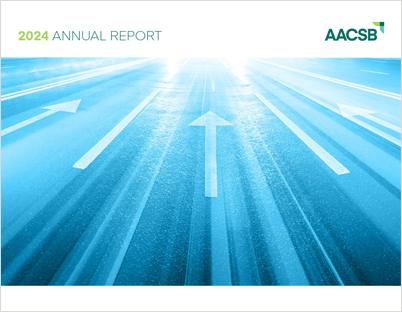Newly Accredited: Mahidol University on Earning AACSB Accreditation
In this series, AACSB spotlights business schools around the world that have recently earned AACSB accreditation. We ask the business school leadership about their journey to accreditation and what the new achievement means to them.
We talk jointly with Duangporn Arbhasil, dean, and Kriengkrai Tankoonsombut, assistant dean of accreditation and quality assurance, at the College of Management, Mahidol University (CMMU), about their recent experience of pursuing and attaining accreditation. They remark about how the process enabled them to answer important, longstanding questions about their school’s purpose and whether it was being fully served. They even made some pleasant discoveries along the way.
Why was it important for your school to undergo the rigorous process of earning AACSB accreditation?
AACSB accreditation is really important for us. Although Mahidol University is one of the oldest universities in Thailand, our college is relatively young—having recently celebrated our 23rd anniversary—compared to other public schools in the country that offer business management education. Mahidol University is particularly strong and very well known in the areas of medicine, pharmacy, and sciences, and we wanted our friends around the world to know that we are also good in business management education. Having undergone the very rigorous process of earning accreditation from AACSB is absolutely valuable. We knew it would open the door for more business schools globally to know and recognize us. Not only that, the accreditation process helped us recognize our strengths and weaknesses and identify strategies that would enable us to improve.
What did you learn about your school through your accreditation journey?
One prominent thing we learned during the accreditation process was that we needed to become more mission driven. Going through the initial accreditation process, everything was about the mission and the streamlining of strategies to mission. We may have had good strategies, but were they really fulfilling our mission? That was the question we had to ask ourselves over and over. Beyond that, we also learned that we needed to create impact. We may have had a good mission, but was it creating any impact to our society? That, also, was the question we had to examine repeatedly. An interesting thing we learned was that some little things we had overlooked actually had more impact on society than other seemingly bigger things.
What were the most challenging and rewarding parts of the accreditation process?
The most challenging part was probably similar to what many other business schools faced, and that was how to get buy-in from as many stakeholders as possible. That part, interesting enough, also turned into the most rewarding part later on. It turned out that the university’s administration was exceedingly supportive of our accreditation journey, more so than we had expected. The college’s board of directors unwaveringly showed their long-term commitment to support us in earning AACSB accreditation. Of course, faculty and staff continually worked together to achieve this historical milestone for the college.
The accreditation process could not have ended in a more rewarding manner; we had such a wonderful team of reviewers and observers. Our team was probably one of (if not) the most experienced and knowledgeable teams a visited school could have. It was most rewarding to learn from and be recommended for initial accreditation by this team.
What impact do you hope to see from having achieved AACSB accreditation?
Our university is recognized nationally, and we are very well received throughout the country. Having achieved AACSB accreditation will continue to solidify the claim that we are among the top business schools in Thailand. Internationally is where we expect considerable impact to occur. Some of our students want to further their study overseas, and we want them to get into any good schools they want to go, knowing that their degrees are recognized by the most well-known business accreditation association in the world. We also want more qualified foreign and exchange students to know who we are and feel confident in choosing to come here. And of course, we want to increase school, faculty, staff, and student activities with other schools around the world.
What advice would you give to another school approaching the accreditation process?
AACSB accreditation is very valuable, and the energy you put into achieving it will be worthwhile. Before you start the journey, make sure you and your school understand the magnitude of the tasks ahead. The tasks require a lot of effort as well as financial resources, commitments, involvements, and engagements from the school’s faculty, staff, management, students, and alumni. Once you are ready, then go for it! It will be very rewarding if you stay committed until the end.





